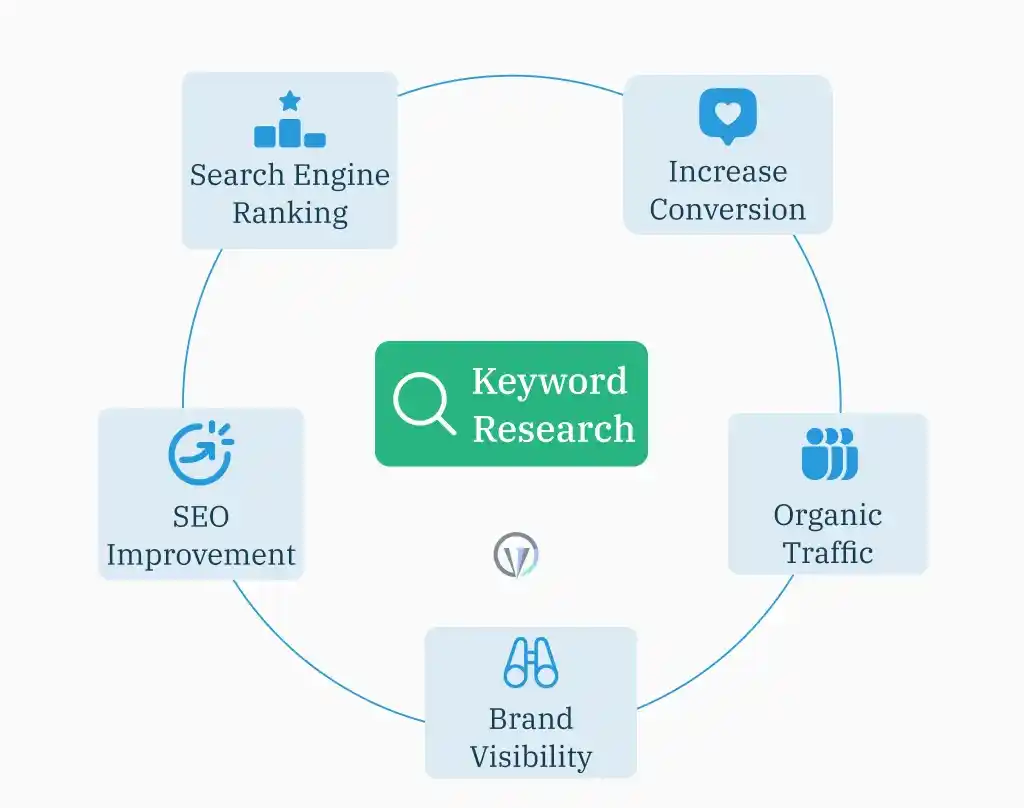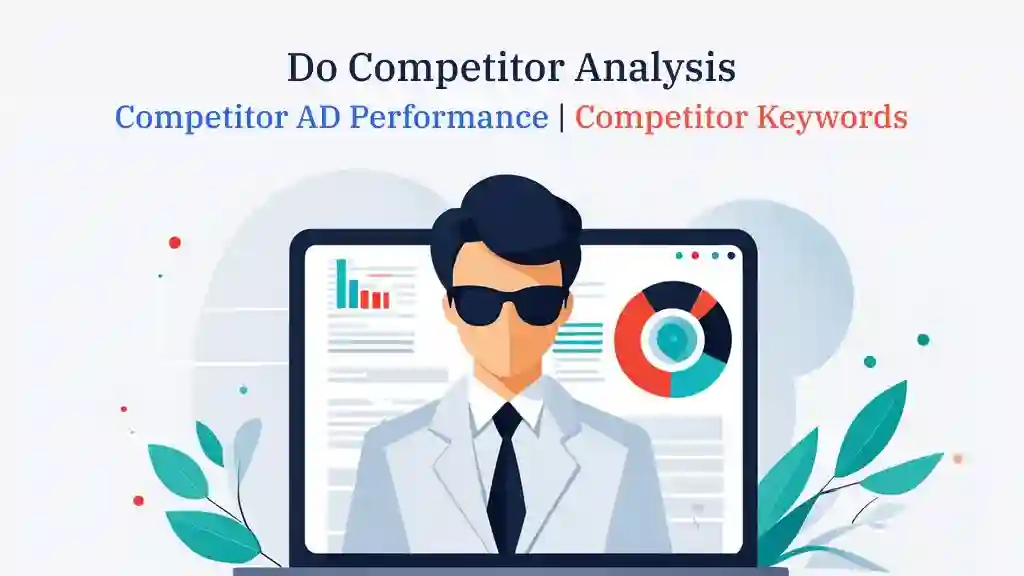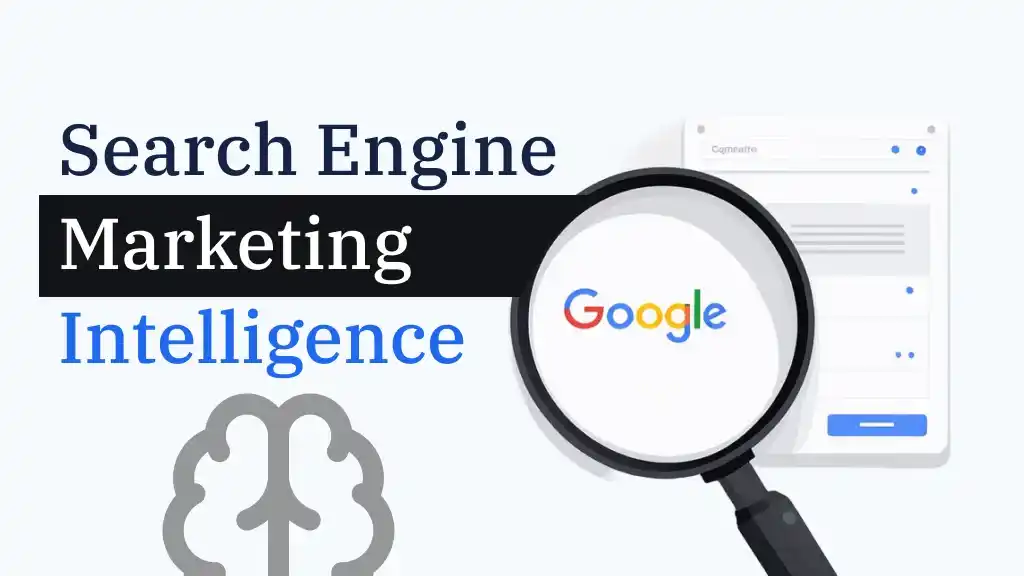In today’s fast-paced digital world, understanding the intricacies of Search Engine Marketing Intelligence (SEMI) is crucial for any business striving to stand out in the crowded online marketplace. At the heart of successful SEM lies a powerful tool known as Search Engine Marketing Intelligence. But what exactly is SEM Intelligence, and why does it matter in today’s digital landscape?
Table of Contents
I. Introduction
A. Definition of Search Engine Marketing Intelligence:
Search Engine Marketing Intelligence encompasses the data-driven insights and strategies used to optimize a company’s online presence across search engine platforms like Google, Bing, and Yahoo.
It delves deep into understanding user behavior, search patterns, and competitor strategies to drive targeted traffic and maximize conversions.
Essentially, Search Engine Marketing Intelligence is the compass guiding businesses through the ever-changing currents of online marketing, helping them navigate towards their goals with precision and efficacy.
B. Importance of SEM Intelligence in Today’s Digital Landscape:
Now, more than ever, consumers turn to search engines to discover, research, and purchase products and services.
With billions of searches conducted daily, the competition for visibility is fierce. This is where Search Engine Marketing Intelligence steps in as a game-changer.
In today’s digital landscape, where every click counts, having a solid grasp of SEM Intelligence can make all the difference. Here’s why:
- Precision Targeting: Search Engine Marketing Intelligence empowers businesses to identify and target their ideal audience with laser-like precision. By analyzing search trends, demographics, and user intent, marketers can tailor their strategies to reach the right people at the right time, maximizing the chances of conversion.
- Enhanced Visibility: With search engines constantly evolving their algorithms, simply having a website is no longer enough to attract traffic. Search Engine Marketing Intelligence enables businesses to stay ahead of the curve by optimizing their content, keywords, and ad campaigns to rank higher in search engine results pages (SERPs).
This increased visibility not only drives more traffic but also boosts brand credibility and trust. - Competitive Advantage: In the cutthroat world of digital marketing, knowing what your competitors are up to can give you a significant edge. Search Engine Marketing Intelligence allows businesses to monitor competitor strategies, keywords, and ad performance, enabling them to identify gaps and opportunities in the market and position themselves accordingly.
By using the power of data-driven insights and strategies, companies can unlock untapped potential, drive growth, and thrive in the ever-expanding digital ecosystem.
II. Understanding Search Engine Marketing Intelligence
As digital marketers, we understand the importance of harnessing the power of Search Engine Marketing Intelligence to propel our brands to the forefront of the online searches.
But what exactly are the key components of SEM Intelligence, and how do they contribute to our success? Let’s dive into the three pillars that form the foundation of SEM Intelligence: SEO Insights, PPC Analytics, and Competitive Analysis.
A. Key Components of Search Engine Marketing Intelligence
1. SEO Insights:
Search Engine Optimization (SEO) lies at the core of any successful SEM strategy. It’s all about optimizing your website to rank higher in search engine results pages (SERPs) organically. But to do so effectively, we need more than just guesswork; we need actionable insights derived from thorough analysis.
One invaluable tool in our list is Google Analytics. By diving deep into metrics like organic traffic, keyword rankings, and user engagement, we can gain valuable insights into what’s working and what’s not.
For example, by analyzing which keywords drive the most traffic and conversions, we can refine our content strategy to focus on high-performing keywords, thereby increasing our visibility and driving more targeted traffic to our site.
Additionally, tools like SEMrush and Ahrefs provide invaluable data on competitor keywords, backlink profiles, and content strategies. By benchmarking our performance against competitors and identifying areas for improvement, we can stay one step ahead in the SEO game.
2. PPC Analytics:

Pay-Per-Click (PPC) advertising is another essential component of Search Engine Marketing Intelligence, allowing us to target specific keywords and demographics with precision. But running PPC campaigns blindly can quickly drain our budget without delivering the desired results. That’s where PPC analytics comes into play.
Platforms like Google Ads and Bing Ads offer robust analytics dashboards that provide real-time data on campaign performance, including clicks, impressions, click-through rates (CTRs), and conversion rates.
By closely monitoring these metrics, we can identify underperforming campaigns and make data-driven adjustments to optimize our ad spend.
For instance, if we notice that a particular ad is generating a high CTR but low conversions, we can A/B test different ad creatives or landing pages to see which resonates best with our audience.
By continually refining our PPC campaigns based on analytics insights, we can maximize our ROI and drive meaningful results for our business.
3. Competitive Analysis:
In the fast-paced world of digital marketing, keeping an eye on competitor strategies is essential for staying ahead of the curve.
Competitive analysis involves monitoring competitors’ SEO tactics, PPC campaigns, content marketing efforts, and social media presence to identify strengths, weaknesses, and opportunities.
Tools like SpyFu and SimilarWeb offer comprehensive competitive analysis insights, allowing us to uncover competitor keywords, ad copy, and budget allocations. By benchmarking our performance against industry rivals, we can identify gaps in the market and capitalize on untapped opportunities.
For example, if we notice that a competitor is ranking higher for a particular keyword, we can analyze their content strategy and backlink profile to uncover their secret sauce. Armed with this knowledge, we can tailor our own SEO and content marketing efforts to outperform the competition and capture a larger share of the market.
B. How SEM Intelligence Differs from Traditional Marketing Strategies
SEM Intelligence differs significantly from traditional marketing strategies in its approach and execution. Unlike traditional marketing, which often relies on broad demographics and mass media channels, Search Engine Marketing Intelligence leverages data-driven insights to target specific audiences with precision.
In traditional marketing, companies often use television, radio, or print ads to reach a large audience. However, with Search Engine Marketing Intelligence, we can tailor our messages to specific user intent, search behavior, and demographics. This ensures that our marketing efforts are focused and relevant.
Moreover, traditional marketing strategies often involve long lead times and limited measurability. With Search Engine Marketing Intelligence, we can track and analyze campaign performance in real-time, allowing for quick adjustments and optimizations to maximize ROI.
Overall, Search Engine Marketing Intelligence revolutionizes the way we approach marketing by providing actionable insights and measurable results, making it a cornerstone of modern digital marketing strategies.
III. Leveraging SEM Intelligence for Business Growth
A. Targeted Keyword Research and Optimization
In the realm of digital marketing, targeted keyword research and optimization are the bedrock upon which successful campaigns are built. With Search Engine Marketing Intelligence, we unlock the power to unearth high-value keywords and capitalize on emerging trends, driving significant business growth.
1. Identifying High-Value Keywords:
SEM Intelligence empowers us to identify the precise keywords that our target audience is searching for. By diving deep into keyword research tools like SEMrush or Google Keyword Planner, we can uncover valuable insights into search volume, competition levels, and user intent.

Armed with this data, we can strategically select keywords that align with our business objectives and have the potential to drive meaningful traffic and conversions.
For example, suppose we’re a multinational e-commerce retailer selling fitness equipment. Through Search Engine Marketing Intelligence, we might discover that “home gym equipment” and “fitness gear for small spaces” are high-value keywords with significant search volume and relatively low competition.
By strategically incorporating these keywords into our website content, product descriptions, and PPC campaigns, we can attract highly qualified leads who are actively seeking what we offer.
2. Analyzing Keyword Trends:
In addition to identifying high-value keywords, Search Engine Marketing Intelligence allows us to stay ahead of the curve by analyzing keyword trends in real-time. By monitoring shifts in search behavior, seasonality, and emerging trends, we can adapt our keyword strategy accordingly to capitalize on new opportunities and stay relevant in the ever-evolving digital landscape.
For instance, suppose we’re a multinational travel company. Through Search Engine Marketing Intelligence, we might notice a sudden surge in searches for “sustainable travel destinations” or “eco-friendly accommodations.”
By pivoting our keyword strategy to incorporate these trending terms and aligning our content with eco-conscious travel practices, we can position ourselves as a leader in sustainable tourism and attract a growing segment of environmentally-conscious travelers.
B. Crafting Compelling Ad Campaigns
In the dynamic world of digital marketing, building compelling ad campaigns is essential for capturing the attention of our target audience and driving meaningful results. With SEM Intelligence at our disposal, we have the tools and insights needed to create ad campaigns that resonate with our audience and deliver maximum impact.
1. Utilizing PPC Data for Effective Ad Copy:
Pay-Per-Click (PPC) advertising offers a wealth of data and insights that can be leveraged to craft highly effective ad copy.
Through Search Engine Marketing Intelligence, we can analyze PPC data such as click-through rates (CTRs), conversion rates, and ad performance metrics to understand what resonates with our audience and drives results.
For example, by analyzing which ad headlines or descriptions generate the highest CTRs, we can identify language and messaging that captures our audience’s attention and compels them to take action. Similarly, by studying which ad creatives or offers lead to the most conversions, we can refine our ad copy to focus on what truly motivates our audience to convert.
Utilizing PPC data for effective ad copy isn’t just about guesswork; it’s about using data-driven insights to tailor our messaging to the specific needs and preferences of our audience, ultimately driving higher engagement and ROI.
2. Optimizing Ad Placement and Timing:
In addition to crafting compelling ad copy, optimizing ad placement and timing is crucial for maximizing the impact of our ad campaigns. With Search Engine Marketing Intelligence, we can analyze data on ad placement, device usage, and time-of-day performance to identify the most effective placement and timing strategies.
For instance, through detailed analysis of ad performance across different devices, we might discover that mobile users are more likely to engage with our ads than desktop users. Armed with this insight, we can allocate more budget towards mobile ads and tailor our ad creative to better resonate with mobile users.
Similarly, by analyzing ad performance by time-of-day, we might uncover that our ads perform best during certain hours or days of the week. By strategically scheduling our ads to appear during these high-performance windows, we can maximize visibility and engagement, ultimately driving more conversions and revenue.
C. Monitoring Competitor Strategies
In the fast-paced world of digital marketing, keeping a close eye on competitor strategies is essential for staying ahead of the curve and capitalizing on untapped opportunities.
With Search Engine Marketing Intelligence, we have the tools and insights needed to analyze competitor keywords, ad performance, and overall marketing strategies, allowing us to refine our own approach and maintain a competitive edge.

1. Analyzing Competitor Keywords and Ad Performance:
One of the key benefits of SEM Intelligence is the ability to analyze competitor keywords and ad performance in real-time. By leveraging tools like SEMrush, SpyFu, or Google Ads’ Auction Insights, we can gain valuable insights into which keywords our competitors are targeting and how their ads are performing relative to ours.
For example, through competitor keyword analysis, we might uncover high-value keywords that our competitors are ranking for but that we haven’t yet targeted.
Armed with this insight, we can adjust our keyword strategy to include these lucrative terms, thereby increasing our visibility and driving more targeted traffic to our site.
Similarly, by analyzing competitor ad performance, we can gain valuable insights into which ad copy, offers, and calls-to-action are resonating with our target audience. This allows us to refine our own ad creative and messaging to better compete in the marketplace and capture the attention of potential customers.
2. Identifying Untapped Opportunities:
Beyond simply analyzing competitor strategies, Search Engine Marketing Intelligence also allows us to identify untapped opportunities in the market that our competitors may have overlooked.
By conducting thorough competitive analysis and staying abreast of industry trends, we can uncover gaps in the market or emerging opportunities that we can capitalize on to gain a competitive advantage.
For instance, through competitor analysis, we might notice that none of our competitors are actively targeting a specific niche or demographic segment. This presents us with an opportunity to fill that gap and position ourselves as the go-to solution for that particular audience, thereby capturing market share and driving business growth.
IV. Tools and Resources for SEM Intelligence
Having the right tools and resources at your disposal is essential for driving success. When it comes to SEM Intelligence, there are several indispensable tools that every digital marketer should have. Let’s explore some of the key tools and platforms and how they can be used to gain valuable insights and drive results.
A. Google Analytics and Search Console:
Google Analytics and Search Console are two powerhouse tools offered by Google that provide invaluable insights into website performance and search engine visibility.
Google Analytics allows you to track website traffic, user behavior, and conversion metrics, providing deep insights into how visitors interact with your site. Key features include audience demographics, behavior flow, and conversion tracking, allowing you to identify high-performing pages, understand user engagement, and optimize conversion funnels.
Search Console, on the other hand, focuses specifically on your website’s performance in Google search results. It provides data on search queries, impressions, clicks, and click-through rates (CTRs), allowing you to monitor keyword rankings, identify opportunities for optimization, and diagnose potential issues such as crawl errors or penalties.
Key Benefits:
- Comprehensive website performance tracking.
- Insights into user behavior and conversion pathways.
- Visibility into search engine performance and keyword rankings.
B. SEMrush:
SEMrush is a versatile SEM tool that offers a wide range of features for keyword research, competitive analysis, and performance tracking.
Key features include:
- Keyword Research: Discover high-value keywords, analyze search volume and competition, and identify long-tail keyword opportunities.
- Competitor Analysis: Uncover competitor strategies, analyze their keyword rankings, ad campaigns, and backlink profiles to identify areas for improvement.
- Site Audit: Identify technical SEO issues, optimize site structure, and improve overall website health for better search engine visibility.
- Position Tracking: Monitor keyword rankings, track SERP features, and benchmark performance against competitors.
Key Benefits:
- Comprehensive suite of SEM tools for keyword research, competitive analysis, and site optimization.
- Actionable insights for improving search engine visibility and driving targeted traffic.
- User-friendly interface with customizable reports and dashboards.
C. Ahrefs:
Ahrefs is another powerful SEM tool known for its robust backlink analysis and competitive intelligence features.
Key features include:
- Backlink Analysis: Explore your website’s backlink profile, analyze link quality and authority, and identify opportunities for link building.
- Site Explorer: Gain insights into competitor websites, analyze their top pages, backlinks, and referring domains to inform your own SEO strategy.
- Keyword Explorer: Discover new keyword opportunities, analyze search volume, difficulty, and click metrics to prioritize your keyword targeting.
- Content Explorer: Identify popular content topics, analyze social shares and backlinks, and uncover content gaps to inform your content strategy.
Key Benefits:
- Extensive backlink analysis capabilities for understanding link profiles and building authority.
- Comprehensive competitor analysis tools for benchmarking performance and identifying opportunities.
- Advanced keyword research and content analysis features for optimizing your SEO strategy.
D. Other Recommended Tools and Platforms:
In addition to Google Analytics, Search Console, SEMrush, and Ahrefs, there are several other SEM tools and platforms worth considering, depending on your specific needs and objectives:
- Moz: Offers a suite of SEO tools for keyword research, link building, and site optimization.
- SpyFu: Provides competitive intelligence tools for analyzing competitor keywords, ad campaigns, and PPC strategies.
- Screaming Frog: A website crawler tool for identifying technical SEO issues, analyzing site structure, and improving crawlability.
Ultimately, the key to effective Search Engine Marketing Intelligence is leveraging a combination of tools and platforms to gain comprehensive insights into your website’s performance, competitor strategies, and market opportunities.
V. Best Practices for Implementing SEM Intelligence
As digital marketers, we understand that success in the ever-evolving world of Search Engine Marketing (SEM) requires more than just set-it-and-forget-it strategies. To truly leverage the power of SEM Intelligence and drive meaningful results, it’s essential to implement best practices that prioritize continuous monitoring, iterative optimization, and staying abreast of industry trends and algorithm changes.
A. Continuous Monitoring and Analysis:
One of the fundamental principles of Search Engine Marketing Intelligence is the importance of continuous monitoring and analysis.
In today’s fast-paced digital landscape, consumer behaviors, search trends, and competitor strategies can change in the blink of an eye. By staying vigilant and monitoring key metrics and performance indicators on an ongoing basis, we can quickly identify trends, opportunities, and areas for improvement.
For example, let’s consider a scenario where we’re running a Google Ads campaign for a multinational e-commerce retailer. By regularly monitoring metrics such as click-through rates (CTRs), conversion rates, and cost-per-acquisition (CPA), we can gain insights into which ads, keywords, and targeting strategies are driving the best results.
If we notice a decline in performance or a sudden change in consumer behavior, we can pivot our strategy accordingly, reallocating budget, adjusting ad copy, or refining our targeting parameters to optimize performance and maximize ROI.
B. Iterative Optimization of Strategies:
SEM Intelligence is all about data-driven decision-making and continuous improvement.
Rather than relying on guesswork or gut instinct, we use insights derived from data analysis to iteratively optimize our SEM strategies for maximum impact.
For instance, suppose we’re conducting A/B testing on landing pages for a multinational software company’s PPC campaign. By analyzing metrics such as bounce rate, time on page, and conversion rate for each variation, we can identify which elements resonate best with our audience and drive the highest conversion rates. Armed with this knowledge, we can refine our landing pages further, testing different headlines, calls-to-action, or visual elements to continuously improve performance and drive better results over time.
C. Staying Updated with Industry Trends and Algorithm Changes:
In the fast-paced world of digital marketing, staying ahead of the curve means staying updated with the latest industry trends and algorithm changes. Search engines like Google are constantly tweaking their algorithms to deliver more relevant and personalized search results, and these changes can have a significant impact on our SEM strategies.
For example, Google’s focus on mobile-first indexing highlights the significance of mobile optimization for search rankings. Keeping up with this trend and optimizing our websites and ad campaigns for mobile users will help us follow Google’s rules and offer a great experience for our audience.
Similarly, staying updated with industry trends allows us to anticipate shifts in consumer behavior, emerging technologies, and competitive strategies, giving us a competitive edge in the marketplace. Whether it’s keeping tabs on the latest digital marketing conferences, subscribing to industry newsletters, or following thought leaders on social media, staying informed is essential for success in the ever-evolving world of SEM.
Summary
Search Engine Marketing Intelligence (SEMI) is crucial for businesses aiming to stand out in the crowded online marketplace. It encompasses data-driven insights and strategies to optimize online presence across search engines like Google, Bing, and Yahoo.
Key components include SEO insights, PPC analytics, and competitive analysis. SEM Intelligence empowers precision targeting, helping businesses reach the right audience at the right time. Leveraging tools like Google Analytics, SEMrush, and Ahrefs, SEMI drives growth by identifying high-value keywords, crafting compelling ad campaigns, and monitoring competitor strategies.


